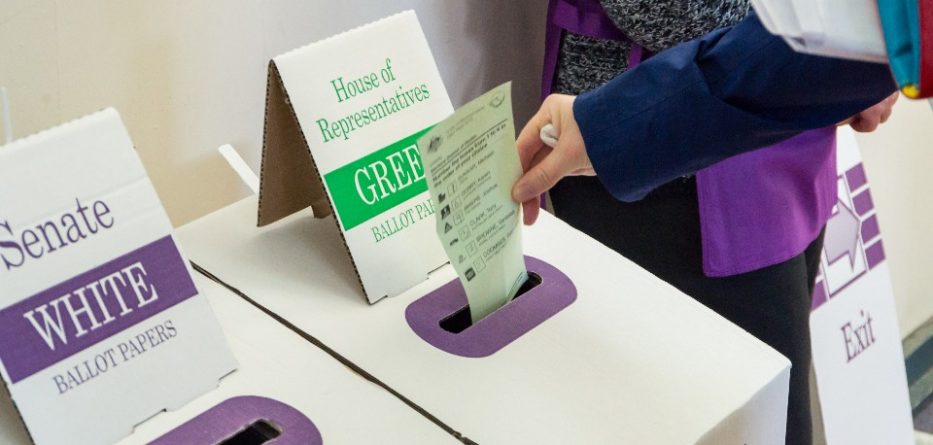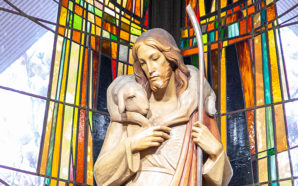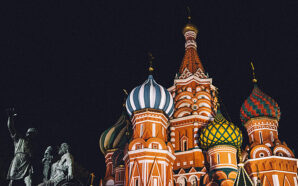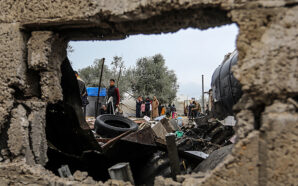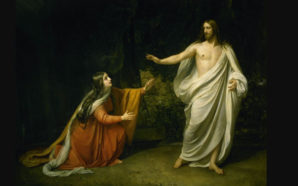Homily for the Fifth Sunday of Easter, Year C
Readings: Acts 14:21-27 ; Psalm 144(145):8-13a; Apocalypse 21:1-5; John 13:31-33,34-35
15 May 2022
The election campaign is all but over. It’s been an endurance test for us voters, let alone for those trying to harvest those votes. Whether we’ve decided to vote blue, red, green, teal or some other combination on the rainbow, we’ve had our fill of promises, unanswered questions, and gotcha moments. Every candidate is promising us a better future, or at least a better future than the one that would await us if one of their opponents were elected in their place. In the weekend papers, I spotted a delightful cartoon entitled ‘The Sightgeist’. It depicts one of those large election posters in the small front yard of a very humble house. It reads: ‘Vote 1: Fairy Godmother. Wishes Granted! Princes Turned into Frogs! *Offer Expires at Midnight’[1]. In the centre of the cartoon is an overweight fairy godmother replete with wings, half-rimmed glasses and a magic wand. To the side is the QR code which is now so much a part of life.
Listen at https://soundcloud.com/frank-brennan-6/homily-15522
Today’s second reading comes from the book of the Apocalypse. I have to admit that I usually gloss over any reading from this flowery book of future hopes in the world to come. But coming to the end of a repetitive and sometimes nasty election campaign purportedly about hopes for a better world to come for everyone, I found myself inspired and hope-filled hearing those words: ‘You see this city? Here God lives among all people. He will make his home among them; they shall be his people, and he will be their God; his name is God-with-them. He will wipe away all tears from their eyes; there will be no more death, and no more mourning or sadness. The world of the past has gone.’ Then the One sitting on the throne spoke: ‘Now I am making the whole of creation new.’
There are some hopes which are realisable this side of the grave. There are some of those hopes which we will come to realise if only we were commit ourselves to a new or better way of doing things. These are hopes which can start making the whole of creation new here and now. There are other hopes which are not realisable on this side of the grave. But they are still hopes that motivate us, hopes that inspire us, hopes that drive us, hopes that help us realise those other hopes which are realisable here and now. They are hopes which will be realised only in the life to come.
As Christians, we carry both these sorts of hopes – the presently realisable ones, whether they be likely or not, and the ones which are realisable only on the other side of the grave. For the atheists amongst us (of whom there is an increasing number), the only hopes are those which are realisable if not here and now, at least in the far distant future here on planet earth. We who carry both sets of hopes can carry hope and joy in our hearts while being surrounded even by seemingly endless despair and sadness. Pope Francis in his encyclical Laudato Si’ says: ‘Those who are committed to defending human dignity can find in the Christian faith the deepest reasons for this commitment. How wonderful is the certainty that each human life is not adrift in the midst of hopeless chaos, in a world ruled by pure chance or endlessly recurring cycles! The Creator can say to each one of us: “Before I formed you in the womb, I knew you”. We were conceived in the heart of God, and for this reason “each of us is the result of a thought of God. Each of us is willed, each of us is loved, each of us is necessary”.’[2]
In recent times, I have had cause to be pondering deeply[3] the Uluru Statement from the Heart in which First Australians speak of their sovereignty as ‘a spiritual notion: the ancestral tie between the land, or ‘mother nature’, and the Aboriginal and Torres Strait Islander peoples who were born therefrom, remain attached thereto, and must one day return thither to be united with our ancestors. This link is the basis of the ownership of the soil, or better, of sovereignty.’[4]
I’ve never heard any of my Aboriginal friends in daily conversation use the language of therefrom, thereto and thither. The description of the spiritual notion of sovereignty is a slight adaptation of words quoted in two of the High Court’s judgments in the 1992 Mabo Case. In turn those two Australian judges were quoting Judge Ammoun a Lebanese judge on the International Court of Justice in the 1975 Western Sahara Case. In turn Judge Ammoun was quoting the Congolese Mr Bayona-Ba-Meya who was intervening in the case for Zaire to argue that ‘Until the recent past, Europe believed itself to be the centre of the world: and still today there are living after-effects of this Europeocentrism. It is only gradually that Europe realizes that there are other forms of civilization, sometimes superior, whose moral and spiritual strength she admires and tries to imitate.’
In 1885, the European powers had carved up large swathes of Africa for themselves on the basis that the lands were terra nullius – land belonging to no one, and land not subject to any form of political organisation. Mr Bayona-Ba-Meya invited the court to make some comparisons between the European and the African:
‘The peasant African does not have running water in his hut or thatched cottage; he has neither electricity nor telephone; perhaps he can neither read nor write; but on the other hand, he hardly suffers from hypertension nor chronic insomnia; he does not suffer heart attack nor liver failure; he has no problems with pollution of all kinds; when he feels a little uneasy, he goes into the forest nearby picking the right plant, which nature has endowed with powers that reveal themselves only to the man living in conscious contact with it.’
Who’d have thought that Mr Bayona-Ba-Meya’s poetic advocacy would have borne fruit in 1975 with ripple effects internationally even reaching the jurisprudential shores of faraway Australia in 1992? Some hopes which were previously thought to be unrealisable can come to fruition.
In Laudato Si’, Pope Francis constantly dares us to hope for the whole of creation being made new. During all election campaigns, the candidates not only play upon our hopes. They also play on our fears, appealing to our own individual self-interest over and above the needs and entitlements of others. Whether voting red, blue, green or teal, we should be challenged by Pope Francis’ words:
‘[E]conomic powers continue to justify the current global system where priority tends to be given to speculation and the pursuit of financial gain, which fail to take the context into account, let alone the effects on human dignity and the natural environment. Here we see how environmental deterioration and human and ethical degradation are closely linked. Many people will deny doing anything wrong because distractions constantly dull our consciousness of just how limited and finite our world really is. As a result, “whatever is fragile, like the environment, is defenceless before the interests of a deified market, which become the only rule”.’[5]
As we go to the polls next weekend, let’s be prudent about realisable hopes and let’s keep alive all our hopes, even those achievable only in a life to come. And let’s have the humility to accept that whatever the strengths of our democracy, we as a nation are unlikely to achieve too many bold hopes for the enhanced human dignity of all on our planet, given our shared concerns about the national interest and national prosperity. Pope Francis is right when he says, ‘We know how unsustainable is the behaviour of those who constantly consume and destroy, while others are not yet able to live in a way worthy of their human dignity. That is why the time has come to accept decreased growth in some parts of the world, in order to provide resources for other places to experience healthy growth. Benedict XVI has said that “technologically advanced societies must be prepared to encourage more sober lifestyles, while reducing their energy consumption and improving its efficiency”.’[6] We haven’t heard that from any candidates whether they be red, blue, green or teal.
While not voting for the fairy godmother, let’s keep alive the hope of a new Jerusalem, even here in the land down under, with God making his home amongst us, we being his people, and he being our God, wiping away the tears, with no more mourning or sadness because the world of the past has gone. If that sounds like the sort of thing you would hear from the fairy godmother, just imagine the atmosphere in that courtroom in the Hague in 1975 when Mr Bayona-Ba-Meya spoke of the ideal simplicity of life for the peasant African, transforming the basis for relations between Indigenous peoples and the descendants of the colonisers.
[1] Glen Le Lievre, ‘The Sightgeist’, The Weekend Australian, Review, 14-15 May 2022
[2] Pope Francis, Laudato Si’, #65
[3] Frank Brennan, ‘The Uluru Statement, the Constitution and the Election’, available at https://www.eurekastreet.com.au/login?p=%2farticle%2fthe-uluru-statement–the-constitution-and-the-election
[4] See https://ulurustatement.org/the-statement/view-the-statement/
[5] Pope Francis, Laudato Si’, #56
[6] Ibid, #193
Fr Frank Brennan SJ is the Rector of Newman College, Melbourne, and the former CEO of Catholic Social Services Australia (CSSA). He has been appointed a peritus at the Fifth Plenary Council of the Australian Catholic Church.




